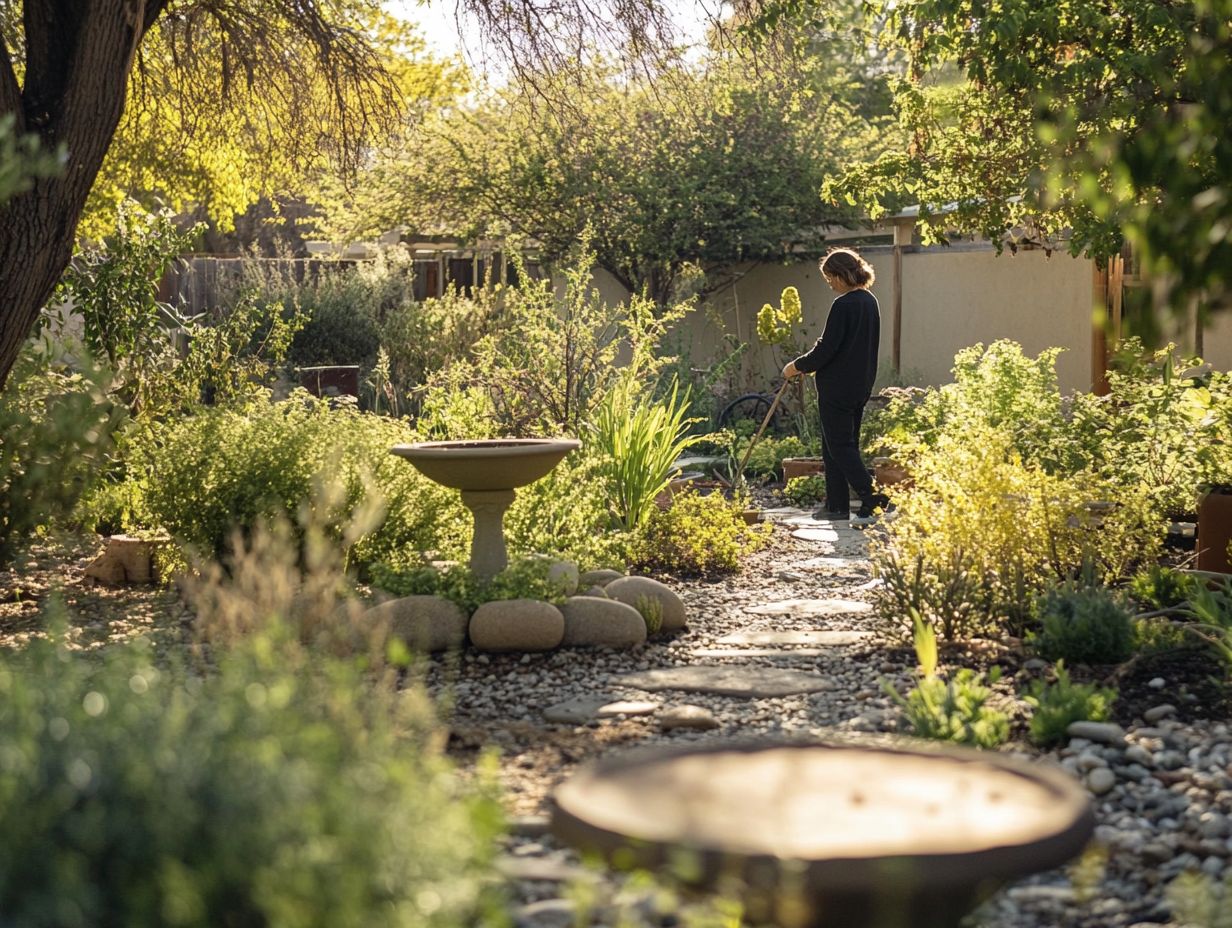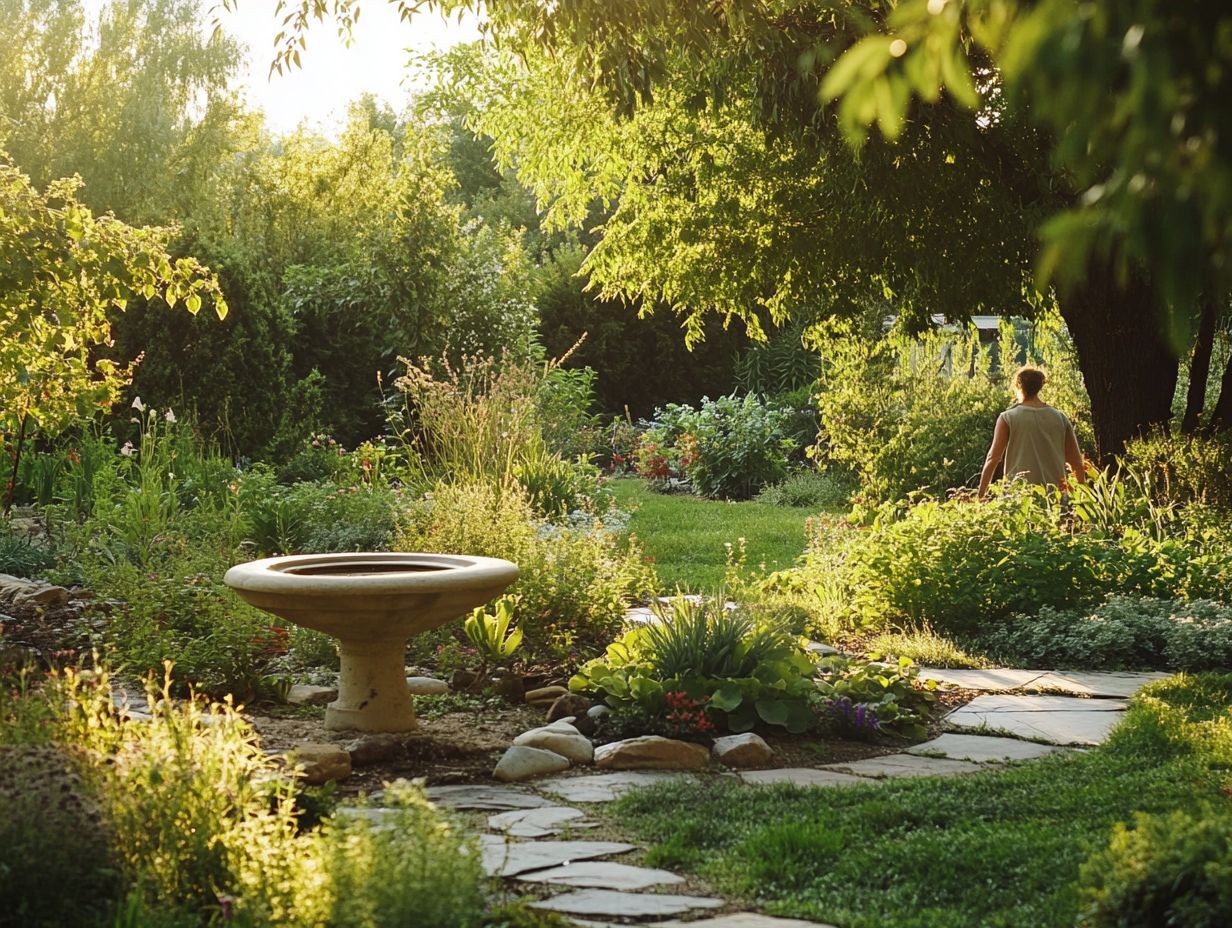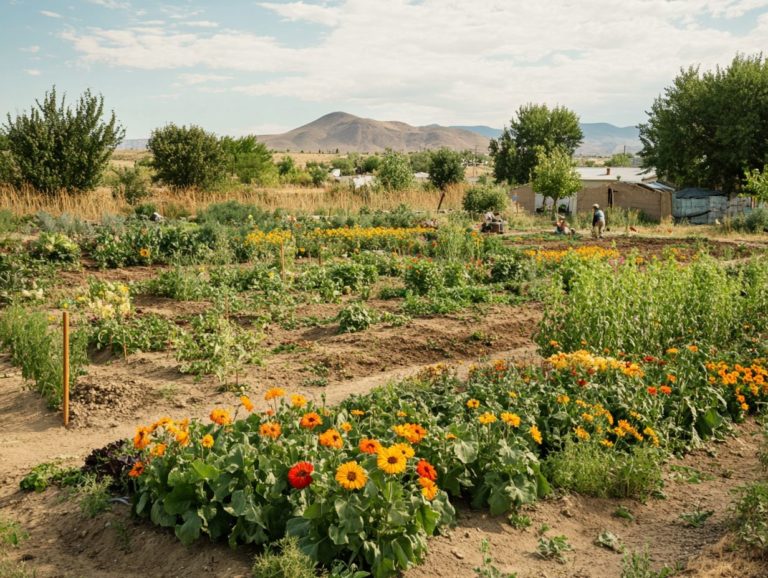The Psychological Benefits of Drought Gardening
Drought gardening goes beyond just planting; it creates a serene retreat that nurtures both the earth and your mind.
As you explore the strong effect gardening can have on mental health, you ll discover how cultivating drought-resistant plants those that can survive with little water not only reduces stress and anxiety but also boosts cognitive function and overall well-being.
You ll find practical tips for starting your drought garden journey, ensuring you can enjoy the incredible benefits of this fulfilling and environmentally-friendly practice.
Immerse yourself in this exploration and see how tending to a drought garden can elevate your mood and transform your mindset.
Contents
- Key Takeaways:
- What is Drought Gardening?
- The Impact of Gardening on Mental Health
- Benefits of Drought Gardening
- Tips for Starting a Drought Garden
- Frequently Asked Questions
- What is drought gardening and how does it benefit our mental health?
- What are some specific psychological benefits of drought gardening?
- How does drought gardening promote mindfulness?
- Can drought gardening be therapeutic for individuals with mental health conditions?
- How can drought gardening help to reduce stress?
- Is drought gardening a sustainable form of gardening?
Key Takeaways:

- Drought gardening positively affects mental health by reducing stress and anxiety while improving cognitive function.
- Choosing drought-resistant plants and practicing water conservation can significantly impact both the environment and mental well-being.
- Drought gardening serves as a powerful tool for promoting mood and well-being, making it accessible and beneficial for everyone.
What is Drought Gardening?
Drought gardening is a refined approach focused on cultivating plants that require minimal water, making it a practical choice for those in arid environments.
This method conserves precious water resources and deepens your connection with nature by using resilient plants that thrive under challenging conditions.
You’ll be amazed at how much this practice boosts your emotional well-being and enriches your gardening experiences. By implementing drought gardening techniques, you promote soil health and foster a growth mindset toward environmental stewardship while enjoying the tranquility of outdoor activities.
The Impact of Gardening on Mental Health
Gardening has a strong effect on mental health, acting as a natural remedy that fosters stress reduction, emotional well-being, and mindfulness.
Gardening activities also connect you with nature, which is essential for cognitive health and overall life satisfaction. Research shows that gardening can help alleviate symptoms of anxiety and depression, enhancing your mental health through nurturing plants and creating lush green spaces.
Positive Effects on Mood and Well-being
Engaging in gardening activities significantly elevates your mood and emotional well-being, offering an effective way to relieve anxiety while providing a rewarding sense of accomplishment.
Nurturing plants and working with soil can boost your self-esteem and enhance your overall satisfaction with life. Participating in community gardening initiatives strengthens social connections and creates a supportive environment for you and others.
Those involved in local community gardens often share how cultivating shared plots diminishes feelings of isolation and ignites joy and creativity. Participants bond over planting schedules, exchange gardening tips, and celebrate each harvest together, nurturing friendships that extend beyond the garden gate.
This sense of belonging creates an uplifting atmosphere conducive to emotional healing.
The tactile nature of gardening, combined with the therapeutic benefits of being outdoors, allows you to immerse yourself in the present moment, effectively sidestepping daily stressors. Even the simple act of planting a seed can instill hope and evoke a profound sense of fulfillment, showing how gardening serves as a powerful antidote to anxiety.
Benefits of Drought Gardening

Drought gardening presents a wealth of advantages that go beyond simple water conservation. It serves as a powerful tool for stress reduction and encourages a healthy diet by allowing you to cultivate nutrient-rich foods.
This approach to gardening not only champions environmental sustainability. It also nurtures your physical and mental well-being. Drought gardening fosters a holistic path to wellness, especially beneficial in an era where many lead increasingly sedentary lives.
Reduced Stress and Anxiety
One of the most remarkable benefits of drought gardening is its capacity to alleviate stress and anxiety. For those interested in learning more, the long-term benefits of drought gardening provide a therapeutic outlet that encourages both physical activity and mindfulness.
As you immerse yourself in caring for plants, you may find yourself entering a state of mindfulness. This enables you to escape the daily grind and cultivate a sense of emotional stability.
Tending to drought-resistant plants creates a rhythmic activity that engages your body while soothing your mind. With each dig of the trowel or sprinkle of water, a rewarding sense of accomplishment unfolds, connecting effort with fulfillment.
This bond with nature can serve as an emotional release. It allows you to confront your thoughts without judgment.
Techniques like deep breathing while planting or focusing on the intricate textures and vibrant colors of the foliage enhance this mindfulness experience. This transforms gardening into a rejuvenating practice that elevates both your mental health and overall well-being.
Improved Thinking Skills
Drought gardening has been linked to improved thinking skills. It enhances mental tasks and assists those with attention deficit challenges.
Engaging with nature through gardening stimulates cognitive processes and supports emotional recovery. This allows you to cultivate a growth mindset and foster emotional resilience.
Research shows that nurturing plants in arid conditions sharpens your focus. It also encourages problem-solving skills as you strategize on water conservation and plant selection.
Spending time in these gardens boosts your emotional well-being. The physical act of gardening promotes mindfulness and reduces stress levels.
Overcoming drought challenges often leads to a profound sense of accomplishment and purpose. This reinforces your ability to face life’s obstacles with a positive and resilient outlook.
This holistic approach to well-being through gardening underscores its significant implications for mental health and adaptability.
Tips for Starting a Drought Garden
Start your drought garden today! Embarking on this journey demands careful planning and a discerning selection of gardening strategies to ensure a flourishing outcome.
Choose drought-resistant plants to set yourself up for success! Prioritize soil health and consider conservation methods.
By honing your plant care techniques, you can cultivate a sustainable ecosystem that thrives in water-scarce conditions. This also enhances emotional well-being and fosters community gardening initiatives while addressing sedentary lifestyle challenges.
Choosing Drought-Resistant Plants

Choosing drought-resistant plants is crucial for your garden’s success. These plants thrive in low-water conditions and improve soil health.
Consider adding succulents, lavender, and native grasses to your garden. They need less water and can grow in less-than-perfect soil.
These plants are easy to care for, requiring minimal pruning and occasional fertilizer. You ll spend more time enjoying their vibrant blooms than worrying about maintenance.
Using mulch helps retain moisture and suppress weeds, promoting the growth of these resilient plants. Engaging with them brings a sense of achievement and enhances your mood.
Conserving Water in the Garden
Water conservation is key to a thriving garden, letting your plants flourish! By using mulching, drip irrigation, and adding nutrients to the soil, you can improve soil health.
These methods not only help you use water efficiently but also create a vibrant ecosystem. Mulching keeps soil moist and wards off pesky weeds.
Drip irrigation delivers water straight to the roots, minimizing runoff and evaporation. Plus, adding organic matter like compost improves soil structure.
Integrate these practices to cultivate a flourishing environment, even with limited water.
The Power of Drought Gardening for Mental Health
Drought gardening offers more than environmental benefits; it greatly impacts your mental health. For instance, understanding the benefits of drought-resistant gardening fosters a closer connection with nature and promotes emotional recovery.
This hands-on approach creates a calming routine. Caring for drought-resistant plants can become a meditative experience.
The focus needed for gardening distracts you from daily stressors, creating a peaceful sanctuary. From personal resilience to community gardening, the restorative power of drought gardening inspires healing.
Frequently Asked Questions
What is drought gardening and how does it benefit our mental health?

Drought gardening is a form of gardening that involves growing plants that are able to survive in dry conditions and require less water to thrive. Studies have shown that engaging in drought gardening can have positive effects on our mental health, such as reducing stress.
This practice helps reduce stress and promotes a healthier lifestyle through physical exercise and improved overall well-being.
What are some specific psychological benefits of drought gardening?
Drought gardening has been found to improve mood and self-esteem. Additionally, it can decrease symptoms of anxiety and depression, promoting relaxation and mindfulness while offering environmental benefits that enhance your gardening experience.
Additionally, it provides a sense of accomplishment and purpose, boosting self-confidence and feelings of happiness.
How does drought gardening promote mindfulness?
When we engage in drought gardening, we are forced to slow down and pay attention to the present moment. This can help us to let go of worries about the past or future and focus on the task at hand.
The repetitive tasks of gardening, like weeding and watering, can also be meditative and help to quiet the mind.
Can drought gardening be therapeutic for individuals with mental health conditions?
Yes, discover how drought gardening can transform your mental health! It has been found to have therapeutic effects for individuals with mental health conditions such as depression, anxiety, and Post-Traumatic Stress Disorder (PTSD).
The combination of physical exercise, exposure to sunlight, and being in nature can help to reduce symptoms and improve overall well-being. Engaging in this practice also promotes a sense of social connection and family bonding.
How can drought gardening help to reduce stress?
Spending time in green spaces and engaging in outdoor activity, like gardening, has been shown to decrease levels of cortisol, the hormone associated with stress. Caring for plants and watching them grow gives you a sense of control and accomplishment.
This can help to reduce feelings of stress and provide anxiety relief.
Is drought gardening a sustainable form of gardening?
Yes, drought gardening is considered a sustainable form of gardening as it requires less water and can help to conserve resources. Additionally, growing drought-resistant plants can reduce the need for chemical pesticides and fertilizers.
This makes it an eco-friendly gardening option that enhances health benefits and promotes the consumption of nutrient-rich foods.
Start your drought gardening journey today and enjoy the mental health benefits it brings!






